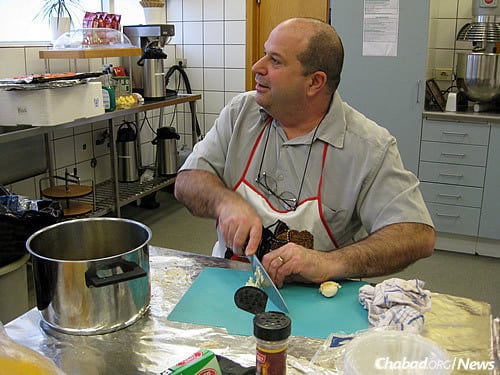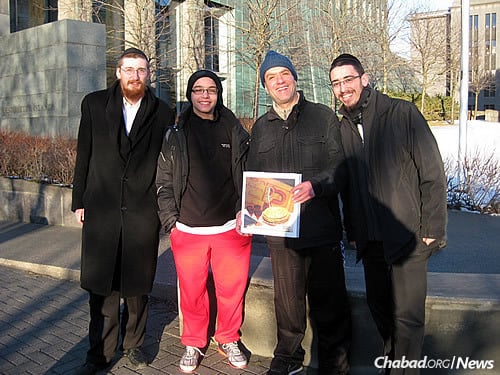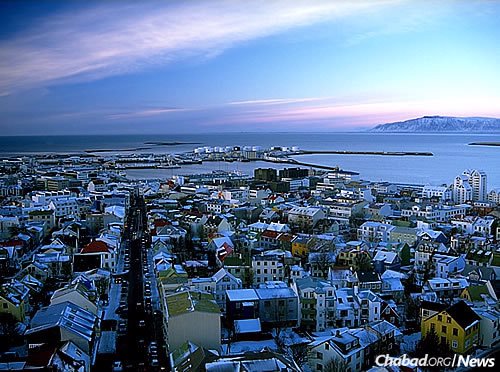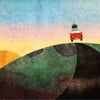The Jewish community in Iceland is unique in the fact that it almost doesn’t exist. With no synagogue, no community center and no official leadership, the Jews of the “Land of Fire and Ice” have had to work extra hard just to bring their scattered brethren together for infrequent meetings timed loosely around Jewish holidays.
In 2011, Rabbi Berel Pewzner—now a Chabad-Lubavitch emissary to the Cayman Islands in the western Caribbean—came to conduct a Passover seder in the Nordic island nation and struck up connections with the locals.
“We are a small community of perhaps 100 Jewish people,” says Dr. Patrick Sulem, a native of France who now lives in Reykjavik, where almost all of the country’s Jews reside. “Almost all of us are foreigners, and there is a lot of fluidity in the Jewish population, so the Chabad rabbis have brought a sense of regularity and consistency to the Jewish gatherings that was somewhat lacking beforehand.”
For the past four years, the rabbi’s younger brother, Rabbi Naftoli Pewzner, has been serving as the community’s personal “Roving Rabbi,” visiting the country for major holidays, and maintaining ongoing email and phone contact with those he meets.
Last year, Pewzner made sure to distribute round, handmade shmurah matzah to every known Jewish person on the island. In the end, he shared matzah with 105 individuals, including a group of six Israeli tourists who were trapped by an avalanche in the northern part of the country.
“The Rebbe—Rabbi Menachem M. Schneerson, of righteous memory—taught us that we need to be there for each and every single Jew,” explains Pewzner, who traveled to Iceland on Sunday to drum up interest and prepare for the seders he will be conducting. “As long as I know that there are still individual Jews here who can use help igniting their Jewish souls, I know there is more work to do.”

Reflecting on the many positive changes he has seen among the tiny Icelandic Jewish population, he compared them to the very terrain that makes Iceland famous.
“When you just see cold ice, you may think there is no life. But there are hot springs gushing out, and you know that there was fiery warmth running underneath all along,” says the 22-year-old Pennsylvania native. “Most people are here because living Jewishly is not very high on their priority list, but I have seen people go to great lengths to attend a Jewish event, do mitzvahs despite significant challenges and otherwise show that Judaism really matters to them.”


‘No Jewish Vikings’
This year, Pewzner will be conducting the seder for 50 people—mostly local residents with a sprinkling of Jewish tourists—together with 23-year-old Rabbi Yosef Wolf of Melbourne, Australia. They came to the country with 300 pounds of kosher supplies, and will be preparing for the seder with the help of an Israeli-born chef who has offered his services free of charge.
For Sulem, whose family traces its roots to Algeria, the Passover seder has been an opportunity to experience the customs and cuisine of Ashkenazi Jewry, exposing him to gefilte fish and a Hebrew pronunciation very different from his childhood traditions. Yet the round matzah are the same as the kind his family used to get from their local Chabad emissaries in France when he was a child.
Since almost none of the attendees are Icelandic natives (“there were no Jewish Vikings,” notes Pewzner), the seders are conducted in English, and much of the chanting done in Hebrew.

For Oren Raz, a 22-year-old Israeli, who has been living in Iceland for more than two years, the seder will be a welcome opportunity to meet fellow members of the tribe.
“It seems that around half of the Jews of Iceland come to the seder,” says Raz, who worked in a ski resort during the winter and will soon be farming during the summer. “This is the time we get to see each other since there are many of us who do not meet on a regular basis.”
Raz says he admires the rabbis for the hard work they put into events, making sure that everyone is appreciated and inspired. “Back in Israel, Jewish holidays happened automatically, whether you put effort into them or not,” says the native of Karmiel in Israel’s north. “Here, I feel the need to celebrate the holidays and observe the traditions since that’s what sets me aside as a Jewish person.”










Join the Discussion